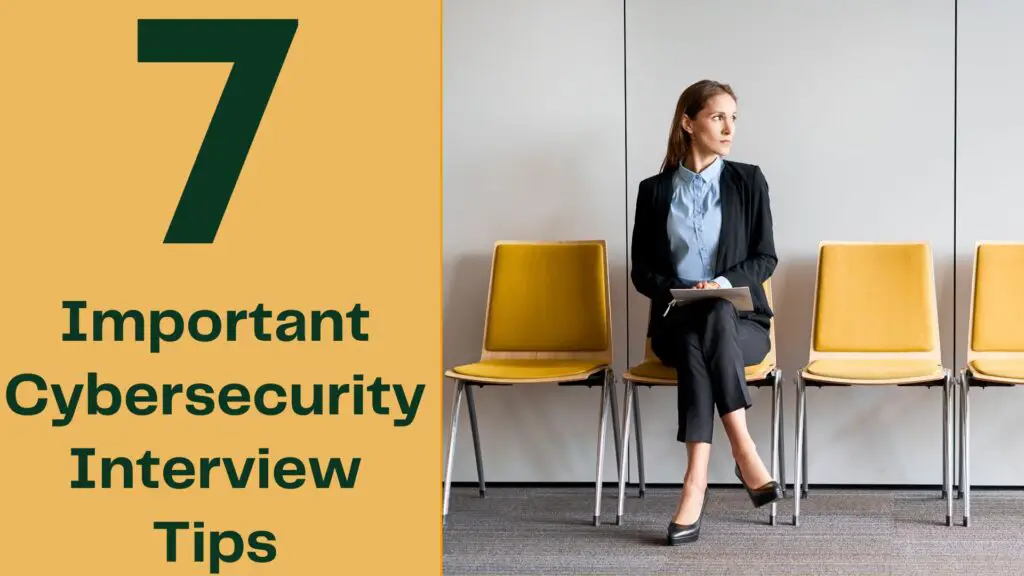You're preparing for a cybersecurity job interview and you want to make sure you ace it. To help you prepare, we've put together a list of the 7 most important cybersecurity interview tips you need to know.
Change your perception of interviews
Do your research
Communicate clearly
Have a unique selling proposition (USP)
Know your role-specific-technical terms
Stick to professionally relevant experiences
Follow up with your interviewer
You might have the technical skills required for the job, but can you talk about them in a way the interviewer will understand? Do you have a wrong perception of cybersecurity interviews? We'll show which perception to uphold and give you the tips you need to nail your interview.

Tip 1: Change Your Perception of Interviews
Too many job seekers in the cybersecurity field see the interview process as a daunting, anxiety-inducing series of hoops they must jump through to (hopefully) land the job they want.
But what if you started seeing interviews as an opportunity instead of an obstacle?
Think about it: every cybersecurity interview is a chance to learn more about yourself, the job market, real-world cybersecurity challenges organizations are facing, and what solutions employers are really looking for.
And it's also an opportunity to practice your networking and communication skills.
So next time you're invited to an interview, view it as a positive step in your cybersecurity career journey and approach it with confidence and excitement. Who knows? You might just walk out with a new job offer in hand.

Tip 2: Do Your Research
The best way to prepare for a cybersecurity interview is to do your research about the company and job role, as well as the interviewer and the key performance factors that interest them.
First, try to learn as much as you can about the company and the specific cybersecurity job role you are interviewing for. You can carry out this exercise by looking the company up on LinkedIn or the company's website.
What kind of problems is the job expected to solve? What challenges does the company face? What is the company's mission?
The more you know about the company and how the cybersecurity job position is going to help the company solve its problems and challenges, the better prepared you will be to answer questions during the interview.
Second, it is equally important to understand who your interviewer is and what they are looking for in a candidate. This will allow you to tailor your answers to the specific key performance factors that interest them.
There are three main types of interviewers to expect during your cybersecurity interview:
Human resources,
Managers/supervisors, and
Coworkers/peers
Each of the above audiences is listening for slightly different success criteria, sometimes the criteria may overlap.
Human resources professionals are typically focused on organizational fit, while managers and supervisors are more interested in functional performance and cybersecurity technical skills. On the other hand, coworkers and peers tend to focus on personality and teamwork.
By tailoring your answers to the specific key performance factors that interest each type of interviewer, you will be able to make a more impactful impression and increase your chances of being hired.

Tip 3: Communicate Clearly During The Cybersecurity Interview
When discussing your resume, elaborate on how your skills will be applicable and relevant to the company's needs.
Be specific and give examples. This will help the interviewer understand how you would be an asset to the company, and it will also give them an idea of your problem-solving abilities.
Focus on outcomes, not actions.
For example, if you're asked about a time when you had to solve a difficult problem, don't just describe the steps you took to solve it. Instead, focus on the outcome of your efforts and what was accomplished. Use words like "I managed," "I developed," "I solved," "I communicated," etc.
This will help the interviewer understand the impact you have made in your previous roles and whether or not you would be able to replicate that success in their company.
Finally, the potential cybersecurity employer wants to know that you can communicate effectively, so make sure your answers tell the story of your role-applicable skills, training, and experience clearly and concisely.
Also, make sure to keep eye contact, try to end your answers with questions, and use good body language the whole time.

Tip 4: Develop Your Unique Selling Proposition
In many cases, a candidate's unique selling proposition (USP) is what sets them apart from the competition and secures the job offer.
In the cybersecurity field, where there is increasingly high demand and fierce competition for top talent, it is more important than ever to have a clear USP before going into an interview.
So, how can you develop your unique selling proposition?
Take some time to think and answer these questions:
Are you the proper fit for the company? Does the company's mission matter to you, and does it align with your values?
Think about your skills and accomplishments. What have you done that has demonstrated your ability to excel in cybersecurity? Are there any problems you've solved in the past that could help you in this new job?
What will you do? Consider what you can offer the company in terms of future potential. What innovative ideas do you have for tackling cybersecurity threats? How could you help the company achieve its goals?
Candidates who can answer these main questions in a way that is both unique and relevant to the company are the ones who will stand out.
Resource: Visit the high 5 test website to find out what your strengths are.

Tip 5: Know Your Cybersecurity Role-Specific Terms
In the cybersecurity field, it is essential to be able to communicate using specialized terminology. This demonstrates your subject authority to potential employers.
In addition, during the preparation for your cybersecurity interview, create a glossary or mind map of terms related to the job role you are applying for, and make sure that you understand the meanings of the terms, as they might come up during the interview process.

Tip 6: Stick To Professionally-Relevant Information
It's also important to be aware of the kind of information that you share during the cybersecurity job interview. While it's important to be open and honest, avoid sharing anything that could be considered too personal.
Stick to discussing your professional experience and qualifications that are relevant to the job, and save the personal details for later.
For example, if you're interviewing for a position in cybersecurity incident response, you might mention that you enjoy attending security conferences or keeping up with the latest news in the industry, but you wouldn't want to share anything too personal, like your thoughts on the current political climate.
The interviewer wants to know that you're qualified for the job and that you would be a good fit for the company's culture, so focus on sharing information that will help them make that decision.

Tip 7: Follow Up With The interviewer
A cybersecurity job interview is not only an opportunity for an employer to get to know you, but it's also a chance for you to learn more about the company and decide if it's a good fit for your skills and goals.
After the interview, take some time to reflect on your experience and what you learned.
If you decide that the company is right for you, don't hesitate to follow up with a formal thank-you note, that, again, thanks the interviewer for their time, expresses interest, and emphasizes a positive point that was either not mentioned before or deserves to be highlighted.
Final Thoughts
Use every cybersecurity job interview, regardless of the outcome, as a chance to improve and learn. Keep personal notes on what went well and what could be done better next time. Cybersecurity job interviews are a unique, infrequently used skill that improves with practice and experience.
Believe in your education, skills, experience, and yourself. This sincere, confident self will help the hiring person perceive your potential in their position more than any rehearsed, specific behavior or polished answer.